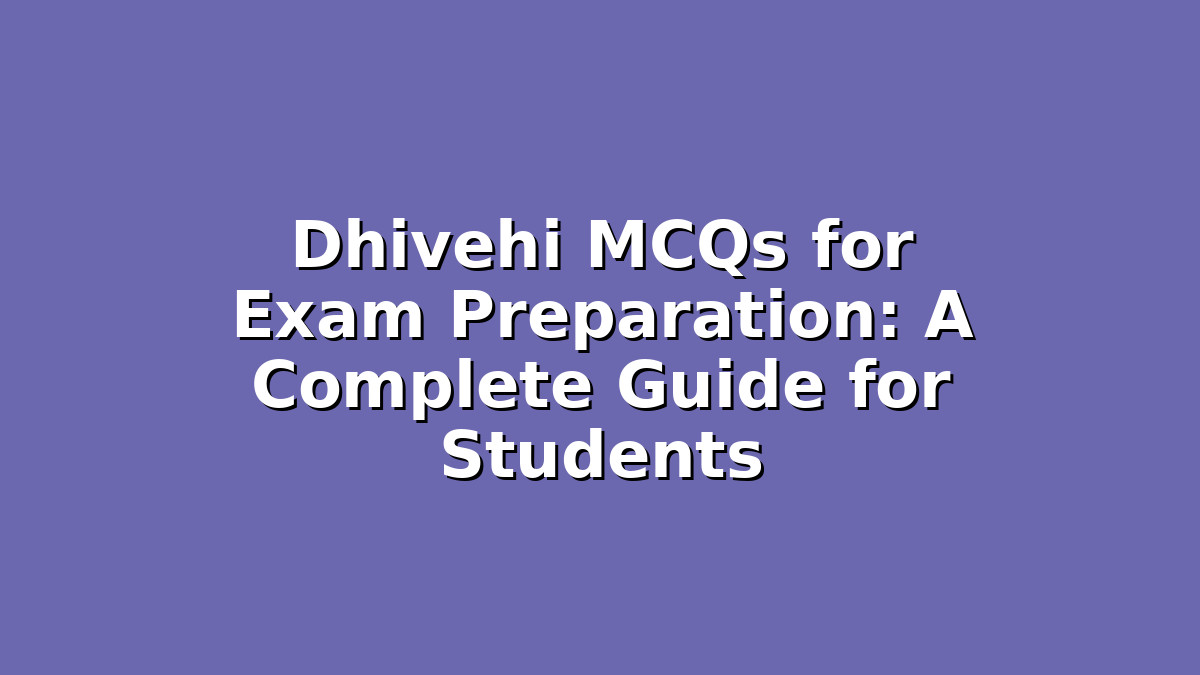Preparing for exams can be a stressful experience for many students, especially when the subject at hand is Dhivehi, the official language of the Maldives. Whether you are studying for school exams, national tests, or competitive exams, mastering Dhivehi requires consistent practice and smart study strategies. One of the most effective ways to prepare is by using Multiple Choice Questions (MCQs), which not only test your knowledge but also help improve recall speed and exam confidence.
In this article, we will explore how Dhivehi MCQs can help you prepare better for exams. We’ll provide practical tips on how to use MCQs effectively, how to manage your study time, and how to stay motivated throughout your preparation journey.
Why Use Dhivehi MCQs for Exam Preparation?
Before diving into strategies, it’s important to understand why MCQs are a valuable tool in your study arsenal.
1. Test Your Understanding Quickly: MCQs allow you to assess your grasp of Dhivehi grammar, vocabulary, literature, and comprehension in a quick and structured way.
2. Identify Weak Areas: Regular practice with MCQs helps pinpoint topics that need more attention.
3. Improve Time Management: The format trains you to think fast and choose answers promptly, which is crucial during timed exams.
4. Boost Confidence: Seeing progress through correct answers builds confidence and reduces exam anxiety.
Now, let’s look at how you can incorporate Dhivehi MCQs effectively into your study routine.
—
Section 1: Creating a Solid Foundation with Dhivehi MCQs
To begin your exam preparation, start by building a strong foundation of the Dhivehi language basics.
– Start with Core Topics: Focus on fundamental grammar rules, common vocabulary, verb conjugations, sentence structures, and punctuation. Look for MCQs that cover these areas to ensure you understand the building blocks.
– Use Reliable Study Materials: Choose MCQ question banks from trusted textbooks, education portals, or past exam papers. Authentic materials will give you a realistic idea of the exam format and question difficulty.
– Mix Difficulty Levels: Begin with easier MCQs to build confidence, then gradually move to moderate and challenging questions. This incremental approach helps reinforce learning without overwhelming you.
– Take Notes: While practicing, jot down tricky questions or topics you find confusing. Revisiting these notes later will help solidify your understanding.
By focusing on foundational topics through MCQs, you create a strong base to tackle more complex Dhivehi language challenges.
—
Section 2: Using MCQs to Enhance Active Learning and Retention
One of the reasons MCQs are effective is that they promote active learning, which leads to better retention of information. Here are some strategies to maximize your learning with Dhivehi MCQs:
– Practice Regularly and Consistently: Set a daily or weekly schedule to practice Dhivehi MCQs. Consistency helps shift information from short-term memory to long-term memory.
– Apply the Process of Elimination: When unsure about an answer, eliminate obviously incorrect options first. This technique is helpful not only during practice but also in the actual exam.
– Self-Explain Your Choices: After answering an MCQ, explain to yourself why you chose that answer and why other options are incorrect. This deepens comprehension and clarifies concepts.
– Review Mistakes Thoroughly: Incorrect answers are golden learning opportunities. Analyze why you made a mistake—was it due to misunderstanding, carelessness, or lack of knowledge? Then revisit those topics.
– Combine with Other Study Methods: Use MCQs along with reading Dhivehi texts, writing exercises, and listening to spoken Dhivehi. This multi-sensory approach enhances language skills holistically.
Active engagement with MCQs helps make your Dhivehi exam preparation more interactive and effective.
—
Section 3: Managing Exam Stress and Building Exam-Day Confidence
Studying Dhivehi MCQs is not just about knowledge; it’s also about managing exam stress and performing confidently on test day.
– Simulate Exam Conditions: Practice MCQs under timed conditions to get used to the pressure. This improves your time management skills and reduces exam-day anxiety.
– Stay Positive and Motivated: Celebrate small successes, like improving your scores or understanding a difficult concept. Positive reinforcement keeps you motivated.
– Create a Revision Plan: Use MCQs to do quick revisions before exams. Solve mixed-topic question sets to refresh your memory and connect different Dhivehi concepts.
– Practice Mindfulness and Relaxation: Take breaks, meditate, or do breathing exercises to keep stress levels in check. A calm mind enhances focus during both study and exams.
– Seek Support When Needed: Don’t hesitate to ask teachers, friends, or online forums for help with difficult Dhivehi MCQs or concepts. Collaborative learning can clarify doubts faster.
By combining solid preparation with stress management techniques, you can approach your Dhivehi exams with confidence and composure.
—
Conclusion
Dhivehi MCQs are a powerful tool that can transform your exam preparation experience. By building a strong language foundation, actively engaging with practice questions, and managing stress effectively, you set yourself up for success. Remember that consistent practice, smart study strategies, and a positive mindset are your best allies in acing Dhivehi exams.
Keep practicing, stay motivated, and trust in your abilities—you are capable of mastering Dhivehi and achieving excellent exam results!

Responses